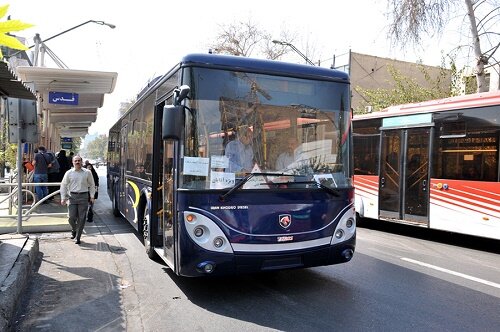Tehran bus fleet delivers 165 million rides within 4 months

TEHRAN – The bus transport system in the metropolis of Tehran has delivered over 165 million rides during the first four months of the current Iranian calendar year (started March 21), Tehran bus operating company's managing director Peyman Sanandaji has said.
On average, more than two million passengers are transported daily by the buses in both public and private sectors in the capital, he stated, Mehr reported on Friday.
Since the beginning of this year until July 22, some 165 million passengers were delivered to their destinations by the Tehran bus fleet, he said, adding that the figure is roughly equivalent to that of the same period last year.
Referring to equipping the buses with diesel particulate filters, he noted that some 41 buses have been equipped with the filters so far.
A diesel particulate filter is a device designed to remove diesel particulate matter or soot from the exhaust gas of a diesel engine by 85 percent, and under certain conditions can attain soot removal efficiencies approaching 100 percent.
“Public transport fleet, operating by Tehran municipality, also is supposed to buy diesel particulate filters, but some of buses are over 10 years old, so cannot be equipped with the filters,” he said.
He went on to add that the rest of the buses amounting to 700 will install the filters by the Iranian calendar year 1401 (March 2022- March 2023).
Sanandaji also highlighted that 100 new articulated buses are planned to be purchased and some of which will be added to Tehran public transport fleet by the next month.
“Currently, 5,926 buses are operating in Tehran’s bus transport fleet, 1,342 of which are at service in the public sector and 4,584 in the private sector,” he added.
“Of all the buses, 3,382 are running on diesel, 2,480 running on gas while some 64 are electric,” he stated, noting that the average lifespan of the fleet is 11.5 years which shows that 3,232 buses accounting for 54 percent are extremely old.
In line with the 5-year development plan of Tehran, some 500 buses are planned to be renovated in addition to 500 new buses to be replaced with old ones this year, Sanandaji concluded.
Moreover, on February 7, Mohammad Javad Heshmati, deputy prosecutor general, said that more than 80 percent of the air pollution in metropolises is caused by low quality fuel.
So it is not so farfetched to conclude that air pollution in Tehran and other metropolises of Iran are derived from low quality fuel and the old transportation system.
Globally transportation accounts for about 21 percent of greenhouse emissions. The International Energy Agency (IEA) has predicted that transport sector emissions of carbon dioxide will increase by 92 percent between 1990 and 2020. Most importantly the age of the transport fleet, the technology used within it and the extent to which such vehicles are maintained as well as the availability of appropriate fuel can decide the amount of emission attributed to the transport sector.
FB/MG
